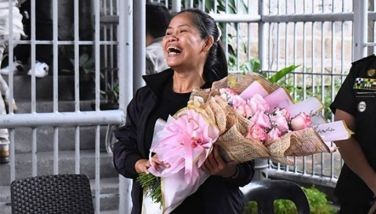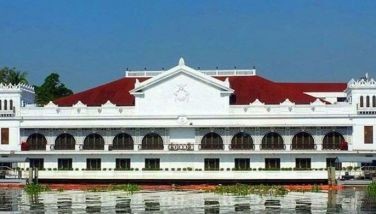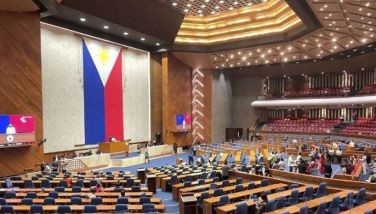RP needs ‘shame campaign’ to fight corruption — expert
March 19, 2005 | 12:00am
All the Philippines needs is an unrelenting "shame campaign" to stamp out corruption in the bureaucracy, the former head of Hong Kong’s Independent Commission Against Corruption (ICAC) has suggested.
"This is what you need, a shame campaign. You have to let the politicians know that corruption is a high-risk crime," Tony Kwok, now a chief adviser of the Office of the Ombudsman, told a roundtable discussion sponsored by the British Council last Tuesday.
But don’t bring the spray paint cans out just yet, though, because Kwok said a scheme similar to that of former Manila mayor now Sen. Alfredo Lim would be inadvisable. "I don’t think so. It has to fit in with the culture. The most effective, of course, is through mass media," he told The STAR.
One way of deterring shenanigans in government, like a similar campaign launched in Hong Kong, is through advertisements in television networks. "The best way is through enforcement and education," he said.
One example, Kwok said, would be a TV ad showing a family of four or five spending their vacation in a suite of a five-star hotel, having breakfast, with the father having a sip of coffee and reading his favorite newspaper.
"Then law enforcers will knock on the door and put him under arrest. Afterwards, he is escorted and handcuffed. You have to make sure that corruption is a shame that nobody should be proud of and be envious about," he told The STAR.
"This is portraying the results of the corrupt practices of the government official. You do it in major ways and in major cases. This shame campaign should be in the form of TV drama series or... commercials," Kwok, also a consultant of the British Council, said.
For his part Assistant Ombudsman Cyril Ramos, who also attended the forum along with British Council director Gill Westaway and director general David Green, said there is a need for the citizenry to participate in the anti-corruption campaign of the government.
"Every Filipino should stop this menace of corruption. People are uncomfortable with the PERC report that the Philippines is the second most corrupt country in Asia. The impact of corruption on the country is so grave," he stressed, referring to the Political & Economic Risk Consultancy Ltd. survey on expatriates.
Ramos cited reports of huge tax leakages in the import industry (smuggling), procurement and under-collection of taxes, which he estimates to be at least P260 billion a year. "If this had been collected, there could have been no need for additional VAT," he said.
At a conference in Cebu City last week, President Arroyo had said her administration was relentlessly fighting the deep-rooted problem of corruption which may be "endemic" in the Philippines.
"This has been an endemic problem. We... must fight corruption because (it) prevents us from being able to use the resources of our government to bring service to our people and also prevents us from being able to mobilize our potential investments in the country," she told reporters after delivering her speech at the Euromoney Philippines Investment Conference.
"While we can’t end it abruptly overnight, we are making decisive moves towards fighting it and ending it within a perceptible period of time," the President added.
The Hong Kong-based PERC said in a study released March 8 that Indonesia, the Philippines and Vietnam are the most corrupt nations in Asia.
PERC, which provides advice to companies and governments on how to do business in Asia, polled more than 900 expatriate respondents across the region in January and February.
The report said one of Mrs. Arroyo’s biggest failings has been her administration’s inability to reduce corruption.
"There are so many examples of the system’s failing to deal with graft that it is hard to draw any conclusion other than the powers-that-be really prefer the status quo to a serious house cleaning," the report said.
It said the Philippines needed to beef up its anti-corruption forces, citing a backlog of 2,000 cases in the country’s anti-graft court.
Chief presidential legal counsel Merceditas Gutierrez said it took Hong Kong 15 years to stamp out corruption through its ICAC. Quoting ICAC chief Kwok, she said the Philippines can do it in seven years or less.
"This is what you need, a shame campaign. You have to let the politicians know that corruption is a high-risk crime," Tony Kwok, now a chief adviser of the Office of the Ombudsman, told a roundtable discussion sponsored by the British Council last Tuesday.
But don’t bring the spray paint cans out just yet, though, because Kwok said a scheme similar to that of former Manila mayor now Sen. Alfredo Lim would be inadvisable. "I don’t think so. It has to fit in with the culture. The most effective, of course, is through mass media," he told The STAR.
One way of deterring shenanigans in government, like a similar campaign launched in Hong Kong, is through advertisements in television networks. "The best way is through enforcement and education," he said.
One example, Kwok said, would be a TV ad showing a family of four or five spending their vacation in a suite of a five-star hotel, having breakfast, with the father having a sip of coffee and reading his favorite newspaper.
"Then law enforcers will knock on the door and put him under arrest. Afterwards, he is escorted and handcuffed. You have to make sure that corruption is a shame that nobody should be proud of and be envious about," he told The STAR.
"This is portraying the results of the corrupt practices of the government official. You do it in major ways and in major cases. This shame campaign should be in the form of TV drama series or... commercials," Kwok, also a consultant of the British Council, said.
For his part Assistant Ombudsman Cyril Ramos, who also attended the forum along with British Council director Gill Westaway and director general David Green, said there is a need for the citizenry to participate in the anti-corruption campaign of the government.
"Every Filipino should stop this menace of corruption. People are uncomfortable with the PERC report that the Philippines is the second most corrupt country in Asia. The impact of corruption on the country is so grave," he stressed, referring to the Political & Economic Risk Consultancy Ltd. survey on expatriates.
Ramos cited reports of huge tax leakages in the import industry (smuggling), procurement and under-collection of taxes, which he estimates to be at least P260 billion a year. "If this had been collected, there could have been no need for additional VAT," he said.
At a conference in Cebu City last week, President Arroyo had said her administration was relentlessly fighting the deep-rooted problem of corruption which may be "endemic" in the Philippines.
"This has been an endemic problem. We... must fight corruption because (it) prevents us from being able to use the resources of our government to bring service to our people and also prevents us from being able to mobilize our potential investments in the country," she told reporters after delivering her speech at the Euromoney Philippines Investment Conference.
"While we can’t end it abruptly overnight, we are making decisive moves towards fighting it and ending it within a perceptible period of time," the President added.
The Hong Kong-based PERC said in a study released March 8 that Indonesia, the Philippines and Vietnam are the most corrupt nations in Asia.
PERC, which provides advice to companies and governments on how to do business in Asia, polled more than 900 expatriate respondents across the region in January and February.
The report said one of Mrs. Arroyo’s biggest failings has been her administration’s inability to reduce corruption.
"There are so many examples of the system’s failing to deal with graft that it is hard to draw any conclusion other than the powers-that-be really prefer the status quo to a serious house cleaning," the report said.
It said the Philippines needed to beef up its anti-corruption forces, citing a backlog of 2,000 cases in the country’s anti-graft court.
Chief presidential legal counsel Merceditas Gutierrez said it took Hong Kong 15 years to stamp out corruption through its ICAC. Quoting ICAC chief Kwok, she said the Philippines can do it in seven years or less.
BrandSpace Articles
<
>
- Latest
- Trending
Trending
Latest
Trending
Latest
Recommended

































